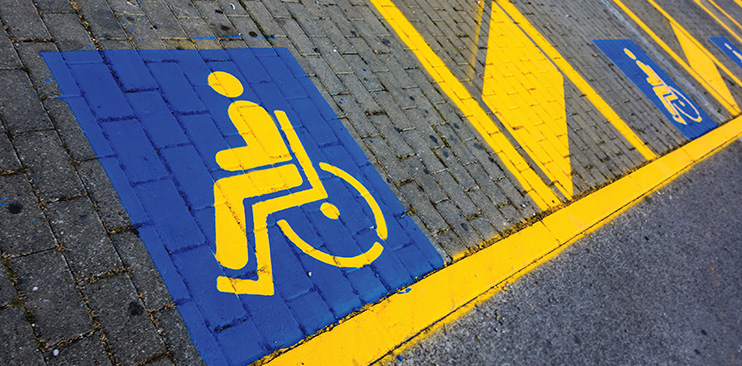The availability of accessible parking is a long-standing issue impacting many people with disabilities across Ontario. Effective and efficient solutions are needed to ensure a streamlined, consistent parking permit system in Ontario. A 2017 document issued by the Minister of Government & Consumer Services states that there are over 729,000 Accessible Parking Permits (APPs) in circulation in Ontario.
The program is administered by Service Ontario, and Service Ontario is responsible for the policy that governs the program and for issuing the permits. While the program is administered by Service Ontario, municipalities are responsible for determining the rights an APP holder may have in their jurisdiction. Law enforcement agencies in each municipality are responsible for applying fines and enforcing the municipal rules of APP use.
 Wendy Murphy, who has been working with Spinal Cord Injury Ontario said, “I was elated when the Accessible Parking Permit program was implemented in the late 80s. I felt it a move toward better access as a whole. It proved we all as people with physical disabilities had a voice that would better facilitate our needs. That right has been dreadfully impeded the last two-to-five years with the number of permits now in circulation. I also see a problem with the permit being easily transferable; being passed on or borrowed by friends and family members. Today, I’m often forced to sit in my car and wait for a spot to become vacant by an individual who eventually walks out to their car. It is a very frustrating reality.”
Wendy Murphy, who has been working with Spinal Cord Injury Ontario said, “I was elated when the Accessible Parking Permit program was implemented in the late 80s. I felt it a move toward better access as a whole. It proved we all as people with physical disabilities had a voice that would better facilitate our needs. That right has been dreadfully impeded the last two-to-five years with the number of permits now in circulation. I also see a problem with the permit being easily transferable; being passed on or borrowed by friends and family members. Today, I’m often forced to sit in my car and wait for a spot to become vacant by an individual who eventually walks out to their car. It is a very frustrating reality.”
Here are some facts on the Accessible Parking Permit program:
- The permits were initiated in the late ‘80s early ‘90s
- There are well over 729,000 active APPs in circulation across Ontario
- In 2016, law enforcement agencies seized over 1,300 APPs due to abuse
- APP holders do not require a driver’s license or need to own a car and can be of any age
- Regulated health practitioners, not Service Ontario, are responsible for establishing whether someone meets health eligibility criteria
- APPs can be used in any municipality in Ontario and also outside Ontario’s borders
- Ontario has the highest fines in Canada for abuse and misuse of the APP
Wendy says, “While I noticed problems with the permit system after 2010, I became a more active advocate on this topic in 2015 working with both March of Dimes, Canada and Spinal Cord Injury Ontario in the hope of seeing change. I have since brought both organizations together in the hope of seeing more significant progress; the power in numbers theory. APP aside, we are hopeful to seeing a Private Members Bill passed that will devise a plan to better regulate the permit.”
And on October 25, 2018, Parliamentary Assistant to the Minister of Labour, Gila Martow (MPP for Thornhill) announced the reintroduction of her Private Member’s Bill 39, Accessible Parking and Towing Industry Review Committee Act, 2018. The Bill aims to assist motorists in their time of need by streamlining a patchwork of local regulations currently governing both the towing industry and the use of accessible parking permits throughout the Province.
The Bill calls for the creation of a taskforce of municipalities, non-profit and non-government agencies, health care organizations, and other partners to develop a streamlined, fair and innovative approach to existing regulations and modernize technology systems currently in use.
“Thousands of Ontarians struggle with mobility issues. They don’t need the extra burden of complex accessible parking rules that vary between municipalities,” said Martow. “Ontarians who require accessible parking shouldn’t face the added trouble of having their spots taken up by users of fraudulent permits.”
Spinal Cord Injury Ontario welcomed the news with CEO Dr. Stuart Howe commenting: “For people with disabilities, accessible parking spaces are an integral part of an independent lifestyle. Spinal Cord Injury Ontario welcomes Bill 39 because we know how vital it is to have a streamlined, consistent parking permit system across the province. We hope this Bill, if implemented, can mark the end of the inappropriate use of parking permits and ensure that permits are available only to those who need them. As a charity, we are working toward our vision of a fully inclusive Ontario and this Bill would be an encouraging move in the right direction.”
Martow added that improvements are needed to protect consumers. “Many people don’t know what their rights are if they find themselves needing a tow or roadside assistance. Bill 39 will strengthen protection for drivers across the Province by making sure they’re treated fairly,” said Martow.
Bill 39 – Accessible Parking and Towing Industry Review Committee Act, 2018’s current status: Ordered referred to the Standing Committee on Social Policy.
In brief, the issues needed to be addressed are:
- Ontario needs a standard practice across all municipalities on the use, equality and procedures of parking permits for people with disabilities.
- End inappropriate distribution and use of parking permits.
- Ontario needs a plan to ensure parking permits are available to those who need them, particularly in response to demographic trends such as population aging.






